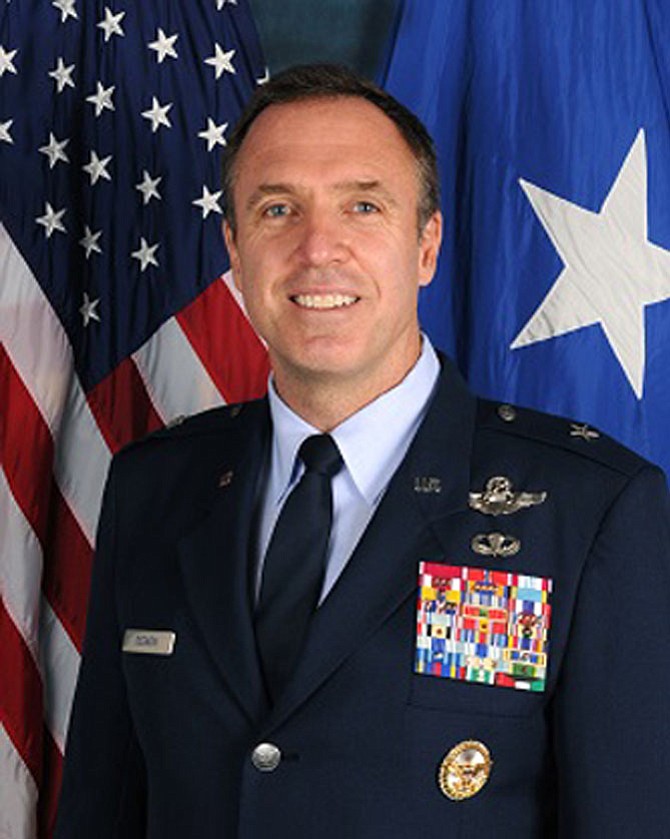McLean — Brigadier General George M. Degnon, U.S. Air Force, has come along way from his native Vienna and his school days at Langley High School in McLean, but his next mission will play out practically in his old home backyard. Degnon was appointed as the Joint Task Force – National Capital Region (JTF-NCR) Deputy for Inaugural Support, reporting to Maj. Gen. Bradley A. Becker, U.S. Army. It’s a posting that he accepted with pride, “even if it’s still a bit surreal.”
The JTF-NCR is tasked with all components of the ceremonial aspects of the event, from the planning, coordination and execution, through the final moments of an inauguration period that runs from Jan. 15 to Jan. 24, “and all of the moving parts in between,” reported Degnon during a phone interview.
U.S. Armed Forces personnel provide musical units, color guards, honor cordons, marching elements, and more, all designed to honor the incoming Commander-In-Chief and to demonstrate control of the military by our civilian populace. Those personnel form a true “integrated Total Force” meaning Soldiers, Marines, Airmen, and Coast Guard will all be participating and representing their branch of service. Brigadier Gen. Degnon and his team – about 820 strong - will be at the helm, coordinating that integrated effort of more than 5,000 service members.
THEIR ROLE may be strictly ceremonial, but just like all of the military who will be in attendance in a variety of roles, the men and women under Degnon’s command for the Inaugural events are always on hand to “about face” and perform as what is termed as “quick reaction forces” in case of emergency.
Civilian law enforcement officers are the ones responsible for the safety and security of all personnel during the proceedings, according to the JFT-NCR’s 58th Presidential Inauguration Fact Sheet. The United States Secret Service is the primary Federal agency for security purposes, FEMA the primary for “consequence management operations,” and the FBI leading the way for crisis management operations.
The military has been contributing to the inaugural process since April 30, 1789, when members of the Continental Army and veterans were among those who escorted General George Washington to Federal Hall in New York City for his swearing-in as the nation’s first president. The JTF-NCR (formerly the Armed Forces Inaugural Committee) first supported a modern-day Inaugural Parade for President Eisenhower in 1953. A quick check of the JTF-NCR archives will tell you that Eisenhower’s parade lasted more than five hours – the longest to date. No one knows how long the parade marking the inauguration of Donald J. Trump as the 45th president of the United States will be, but Degnon says they are prepared for any and all eventualities.
At the time of the interview with the General, there were no specific requests from the Inaugural Committee or from the President-Elect or others of his representatives that were cause for anything other than the normal concern associated with such a major moment in our democratic activities. “Much of what takes place on the actual Inauguration day is done according to Constitutional requirements,” said Degnon. “That aids in the planning and execution, but we are prepared to handle changes and requests wherever possible.”
If those ceremonial obligations weren’t duties enough, the JTF-NCR also serves as the official Department of Defense liaison to the Joint Congressional Committee on Inauguration Ceremonies and the Presidential Inaugural Committee (PIC). They are also tasked with collecting, compiling, organizing and offering their analysis and historical perspective concerning the applications submitted to the PIC for parade participation. “Good thing we have a great team to get us through,” said the Brigadier General.
DEGNON has been involved in previous inaugurations as part of his military duties, but “not at this level.” Any length of conversation with the Brigadier General and the listener is convinced that he and the team really do have their bases covered, and that a local boy will make his hometown and the country proud when doing his part toward the peaceful transition of power.
